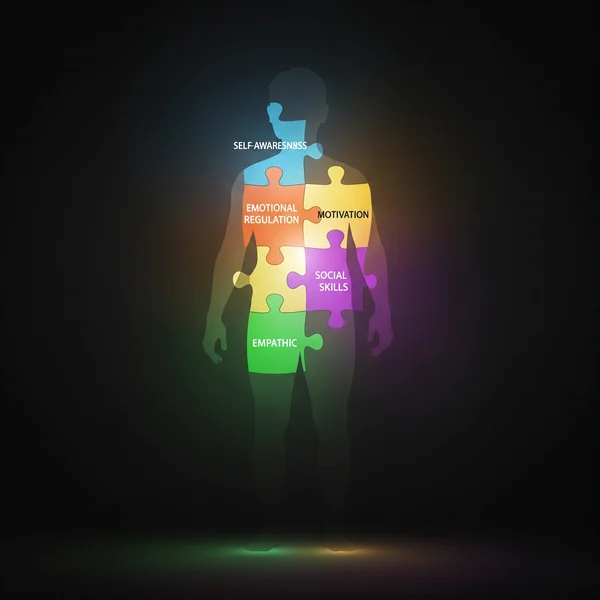الدليل الشامل للذكاء العاطفي (EQ)
August 18, 2025 | By Phoebe Chandler
هل تساءلت يومًا لماذا يتمتع بعض الأشخاص بسهولة في التعامل مع المواقف الاجتماعية، ويبنون علاقات قوية، ويتعاملون مع الضغوط برشاقة، بينما يكافح آخرون؟ غالبًا ما يكمن الجواب ليس في ذكائهم (IQ)، بل في نوع مختلف من الذكاء: الذكاء العاطفي. ولكن ما هو الذكاء العاطفي، وكيف يمكن لفهم هذا المفهوم أن يطلق العنان لإمكانياتك الحقيقية في حياتك الشخصية والمهنية؟ سيأخذك هذا الدليل عبر كل ما تحتاج لمعرفته، من تعريفه الأساسي إلى الطرق العملية التي يمكنك البدء في تحسينه بها اليوم. إذا كنت مستعدًا لبدء رحلة اكتشاف الذات، يمكنك البدء بفهم ملفك العاطفي الشخصي.

ما هو الذكاء العاطفي (EQ)؟ تعريف سهل الفهم
في جوهره، الذكاء العاطفي (أو EQ) هو القدرة على إدراك المشاعر واستخدامها وفهمها وإدارتها والتعامل معها. يتعلق الأمر بالتعرف على حالتك العاطفية والحالات العاطفية للآخرين، واستخدام هذه المعلومات لتوجيه تفكيرك وسلوكك. يمكن للأشخاص ذوي معدل الذكاء العاطفي المرتفع إدارة مشاعرهم، والتواصل بفعالية، وبناء علاقات أقوى وأكثر معنى.
التمييز بين الذكاء العاطفي (EQ) والذكاء العقلي (IQ)
لفترة طويلة، كان يُنظر إلى الذكاء العقلي (IQ) على أنه المحدد الرئيسي للنجاح. يمثل الذكاء العقلي قدراتك المعرفية، مثل التعلم والاستدلال وحل المشكلات. على الرغم من أهميتها، إلا أنها لا تروي القصة كاملة. من ناحية أخرى، الذكاء العاطفي هو قدرتك على إدارة المعلومات العاطفية. فكر في الأمر بهذه الطريقة: قد يمنحك الذكاء العقلي الوظيفة، ولكن الذكاء العاطفي هو الذي سيساعدك على التفوق فيها، وقيادة فريق، وبناء مسيرة مهنية مُرضية.
لمحة تاريخية: من سالوفي وماير إلى جولمان
بينما تعود جذور المفهوم إلى أعمال نفسية سابقة، صاغ الباحثان بيتر سالوفي وجون ماير مصطلح "الذكاء العاطفي" رسميًا في عام 1990. ومع ذلك، كان عالم النفس والصحفي العلمي دانيال جولمان هو من روّج للمفهوم بكتابه الأكثر مبيعًا عام 1995، "الذكاء العاطفي". جلبت أعمال جولمان الذكاء العاطفي إلى التيار الرئيسي، مسلطة الضوء على دوره الحاسم في القيادة والنجاح في الحياة.
لماذا أصبح الذكاء العاطفي أكثر أهمية من أي وقت مضى؟
في عالمنا المتسارع والمترابط اليوم، تعد القدرة على إدارة المشاعر والتفاعلات الاجتماعية قوة خارقة. كيف يكون الذكاء العاطفي المرتفع مفيدًا؟ إنه يؤثر على كل جانب من جوانب وجودنا تقريبًا.
لحياتك الشخصية وعلاقاتك
يسمح لك الذكاء العاطفي المرتفع ببناء علاقات أعمق وأكثر صحة. من خلال فهم مشاعرك الخاصة والتعاطف مع الآخرين، يمكنك التواصل بوضوح أكبر، وحل النزاعات بشكل بنّاء، وتعزيز شعور أكبر بالألفة والثقة مع الأصدقاء والعائلة والشركاء.
لمسارك المهني، وعمل فريقك، وقيادتك
في مكان العمل، يعد الذكاء العاطفي مؤشرًا رئيسيًا للأداء. فهو يُمكّن من التعاون الفعال، ويلهم الثقة في القادة، ويساعد الفرق على تجاوز التحديات. يمكن للقائد ذي الذكاء العاطفي تحفيز فريقه، وتقديم ملاحظات بنّاءة، وإنشاء بيئة عمل إيجابية ومنتجة. يعد تطوير هذه المهارات خطوة حاسمة لأي محترف طموح.
لصحتك النفسية ورفاهيتك
إن فهم وإدارة مشاعرك أمر أساسي لصحتك النفسية. يرتبط الذكاء العاطفي المرتفع بانخفاض مستويات التوتر والقلق، حيث يزودك بالأدوات اللازمة للتعامل مع المشاعر الصعبة دون أن تطغى عليك. هذه المرونة العاطفية هي حجر الزاوية في الرفاهية العامة. خطوة أولى رائعة هي الحصول على خط أساس من خلال اختبار الذكاء العاطفي.
المكونات الخمسة الأساسية للذكاء العاطفي (نموذج جولمان)

حدد دانيال جولمان خمسة مكونات رئيسية تشكل الذكاء العاطفي. إن فهم هذه الركائز هو الخطوة الأولى نحو بنائها.
1. الوعي الذاتي: أساس الذكاء العاطفي
هذه هي القدرة على التعرف على وفهم حالات المزاج والعواطف والدوافع الخاصة بك، وكذلك تأثيرها على الآخرين. يتعلق الأمر بمعرفة نقاط قوتك وضعفك والعمل انطلاقًا من ثقة هادئة.
- مثال: ملاحظة شعورك بالانزعاج وإدراك أن السبب هو تخطيك لوجبة الغداء، بدلاً من لوم زميل لك على خطأ بسيط.
2. التنظيم الذاتي: إدارة عالمك الداخلي
يتضمن ذلك التحكم أو إعادة توجيه الانفعالات والمزاجات المزعجة. إنها القدرة على التفكير قبل التصرف، وإدارة التوتر، والبقاء هادئًا تحت الضغط.
- مثال: تلقي ملاحظات نقدية في اجتماع، وبدلاً من الرد بدفاعية، تأخذ نفسًا عميقًا وتطرح أسئلة توضيحية.
3. الدافعية: قيادة نفسك نحو الأهداف
هذا شغف بالعمل لأسباب تتجاوز المال أو المكانة. يتميز بالدافع العميق لمتابعة الأهداف بالطاقة والمثابرة، والتفاؤل حتى في مواجهة الفشل، والالتزام بمعايير التميز الخاصة بك.
- مثال: الاستمرار في العمل بجد على مشروع طويل الأجل، حتى عندما تكون النتائج الأولية مخيبة للآمال، لأنك تؤمن بالنتيجة النهائية.
4. التعاطف: فهم مشاعر الآخرين
هذه هي القدرة على فهم التركيب العاطفي للآخرين. إنها مهارة التعامل مع الناس وفقًا لردود أفعالهم العاطفية، وهي أساسية للعمل الجماعي وبناء الألفة.
- مثال: الإحساس بأن أحد أعضاء الفريق يشعر بالإرهاق وعرض مساعدته في عبء عمله، دون أن يطلب هو ذلك.
5. المهارات الاجتماعية: بناء اتصالات ذات مغزى
هذه هي الكفاءة في إدارة العلاقات وبناء الشبكات. يتعلق الأمر بإيجاد أرضية مشتركة وبناء الألفة، والتي تمثل تتويجًا للمكونات الأربعة الأخرى.
- مثال: إقناع فريق ببراعة بتبني عملية جديدة من خلال معالجة مخاوفهم وإبراز الفوائد المشتركة.
كيفية اختبار وقياس ذكائك العاطفي
إذًا، كيف يمكنك اختبار ذكائك العاطفي؟ بينما يمكنك اكتساب رؤى من خلال التأمل الذاتي، يوفر التقييم المنظم لقطة أكثر موضوعية لقدراتك الحالية.
الفرق بين الاختبارات التقريرية الذاتية واختبارات القدرات
هناك نوعان رئيسيان من اختبارات الذكاء العاطفي. اختبارات القدرات (مثل MSCEIT) تقدم لك مشاكل عاطفية وتُقيّم إجاباتك على أنها صحيحة أو خاطئة، تمامًا مثل اختبار الذكاء العقلي. الاختبارات التقريرية الذاتية، من ناحية أخرى، تطلب منك تقييم مدى موافقتك على عبارات حول سلوكياتك واتجاهاتك.
فوائد إجراء اختبار ذكاء عاطفي عبر الإنترنت
بالنسبة لمعظم الأشخاص الذين يسعون إلى فهم الذات، يعد اختبار التقرير الذاتي عبر الإنترنت الأداة الأكثر سهولة وفائدة. إنه سريع ومريح، ويوفر رؤى فورية لنقاط قوتك المتصورة ومجالات التطوير عبر الأبعاد الرئيسية للذكاء العاطفي.
ما يمكن توقعه من اختبار الذكاء العاطفي المجاني الخاص بنا
تم تصميم اختبارنا ليكون أداة تقييم ذاتي شاملة ومباشرة. في غضون 10-15 دقيقة فقط، ستجيب على أسئلة تتعلق بالمكونات الأساسية للذكاء العاطفي. عند الانتهاء، ستتلقى ملفًا شخصيًا سريًا يساعدك على فهم حالتك العاطفية.
هل أنت مستعد لاكتشاف ملف الذكاء العاطفي الخاص بك؟ قم بإجراء اختبار الذكاء العاطفي المجاني الآن.
طرق عملية لتحسين ذكائك العاطفي
أفضل خبر عن الذكاء العاطفي هو أنه ليس ثابتًا. إنها مجموعة من المهارات التي يمكنك تعلمها وتطويرها بمرور الوقت. هل تتساءل كيف تبدأ؟
ابدأ بالملاحظة الواعية (زر "التوقف المؤقت")
على مدار اليوم، خذ لحظة للتوقف واسأل نفسك: "ماذا أشعر الآن؟" مجرد تسمية العاطفة (مثل، "أنا أشعر بالإحباط"، "أنا أشعر بالقلق") دون حكم هو خطوة أولى قوية في بناء الوعي الذاتي.
مارس الاستماع النشط في المحادثات
عندما يتحدث شخص ما، ركز بالكامل على ما يقوله بدلاً من التخطيط لردك. انتبه إلى لغة جسده ونبرة صوته. هذه الممارسة تبني التعاطف وتقوي مهاراتك الاجتماعية.
احتفظ بمذكرات للمشاعر لبناء الوعي الذاتي
في نهاية كل يوم، اقضِ خمس دقائق في كتابة المشاعر الرئيسية التي شعرت بها وما الذي أثارها. هذا يساعدك على التعرف على أنماط استجاباتك العاطفية ويقوي قدرتك على التنظيم الذاتي.

ابدأ رحلتك نحو ذكاء عاطفي أعلى اليوم
الذكاء العاطفي ليس صفة غامضة أو أسطورية؛ بل هو مجموعة ملموسة من المهارات التي تؤثر بشكل كبير على نجاحك وسعادتك. من خلال فهم مكوناته، وقياس مستواك الحالي، والالتزام بتمارين عملية، يمكنك الشروع في رحلة تحويلية لتحسين الذات. الخطوة الأولى هي دائمًا الوعي.
ما هي الخطوة الصغيرة التي يمكنك اتخاذها هذا الأسبوع لممارسة ذكائك العاطفي؟ شارك أفكارك في التعليقات أدناه!
أسئلة شائعة حول الذكاء العاطفي
هل يمكن تعلم الذكاء العاطفي وتطويره حقًا؟
بالتأكيد. على عكس الذكاء العقلي (IQ)، الذي يكون مستقرًا نسبيًا طوال الحياة، فإن الذكاء العاطفي هو مجموعة مرنة من المهارات التي يمكن اكتسابها وتحسينها بالممارسة. من خلال الجهد الواعي، والتأمل الذاتي، وأدوات مثل الاحتفاظ بالمذكرات واليقظة الذهنية، يمكن لأي شخص تطوير ذكاء عاطفي أعلى.
ما الذي يعتبر درجة "جيدة" في الذكاء العاطفي؟
لا توجد درجة "جيدة" عالمية. الغرض من اختبار الذكاء العاطفي عبر الإنترنت ليس الحصول على درجة مثالية، بل توفير لقطة للوعي الذاتي. تكمن القيمة في تحديد نقاط قوتك الفريدة وتحديد المجالات المحددة التي لديك فيها أكبر فرصة للنمو.
هل من الممكن أن يكون لديك ذكاء عاطفي مفرط؟
بينما يعد الذكاء العاطفي المرتفع إيجابيًا للغاية، تشير بعض الأبحاث إلى أنه عند المستويات القصوى، يمكن استخدامه للتلاعب إذا لم يقترن بشخصية أخلاقية قوية. ومع ذلك، بالنسبة لغالبية الناس، الهدف هو تطوير هذه المهارات لتعزيز علاقات إيجابية وأصيلة وبنّاءة.